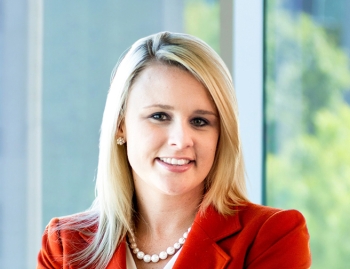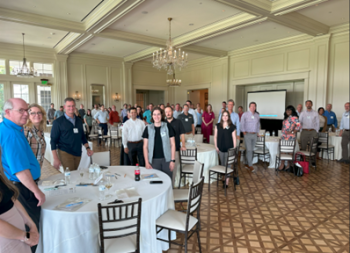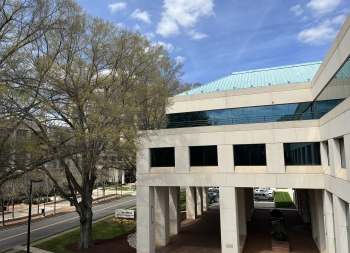Recent Opinions at the Deputy Commissioner Level on COVID Claims
The Industrial Commission has issued two Opinions at the Deputy Commissioner level on COVID claims. Both claims involve pro-se claimants and there was no expert testimony; both claims were denied and no benefits were awarded. While both were in Defendant’s favor, the true value of these decisions is debatable given the lack of expert testimony.
Britney McNeair v Owens Illinois, Inc./O-I Glass
(November 21, 2022); I.C. NOS. 22-002688
Plaintiff, age 33, was a pro se claimant who alleged she contracted COVID on January 8, 2022, while working as a Crew Leader for Defendant. Her position requires her to observe and inspect glass bottles on a conveyer belt and for her to stand at her workstation and walk up the assembly line, assisting other workers. She alleged she contracted COVID after coming in contact with a co-worker while working the conveyor belt. She noticed the coworker was coughing and red and she claimed she had to interact with this coworker several times during her shift. During these interactions, Plaintiff and the coworker were wearing masks. Plaintiff stated she felt ill the evening of January 8, 2022. She missed work from January 8, 2022 to January 26, 2022, and returned to work after this full duty. Defendants denied the claim.
At the July 12, 2022 hearing in front of Deputy Commissioner Anne Harris, Plaintiff testified on her own behalf and Defendant did not call any witnesses. Plaintiff testified that in the days leading up to January 8, 2022, she was in public getting gas, shopping at the grocery store and may have stopped at a few drive-thrus for food. Neither side presented expert testimony and relied only on the stipulated medical records. Plaintiff submitted a “position statement” as opposed to contentions.
DC Harris found in the November 21, 2022 Opinion and Award that Plaintiff contracted COVID on or about January 8, 2022. However, Plaintiff failed to meet her burden of proof to establish a compensable occupational disease or an injury by accident claim. Plaintiff failed to prove she contracted COVID from her work. Further, DC Harris held this position did not put her at an increased risk of contracting COVID compared to the general public as she provided no medical testimony or any other evidence to support this.
While this is a pro se claim with no expert witnesses; this claim shows the Commission will (1) take into account events leading up to the alleged contraction as evidence of causation and (2) look at safety protocols by employers to help them in determining whether a claimant has established causation.
Tony Esai Chambers v North Carolina Department of Public Safety
(December 22, 2022); I.C. FILE NO. 21-708719
Plaintiff, age 52, and appearing pro se, alleged he contracted COVID on November 27, 2020, while working as a Correction Officer for Defendants. He had not returned to work after his alleged exposure and was terminated on February 10, 2021 due to his voluntary leave without notice.
This claim was heard on February 24-25, 2022 in front of Deputy Commissioner Mary Claire Brown. Despite Plaintiff’s testimony he worked from November 1 – 23, 2020, Defendant submitted evidence he did not work from November 20, 2020 to November 26, 2020. In his discovery responses, Plaintiff noted on the date of his alleged contraction, he was in a line up with 50 other officers, had visited the quarantine pod, and had to ride in an ambulance with an inmate who had COVID and he had COVID symptoms that same day. His testimony provided a similar narrative of events. Defendant called a Warden to testify who contradicted Plaintiff, noting he was not assigned to ride to the hospital and was in a different unit than he testified. The Warden also explained the COVID protocols in place, including a face-mask requirement and the fact the facilities were cleaned every 15 minutes.
A post hearing questionnaire submitted by a medical provider who had treated Plaintiff, noted she could not determine whether Plaintiff’s symptoms were caused by COVID or his uncontrolled sleep apnea.
In her December 22, 2022 Opinion and Award, DC Brown found that Plaintiff failed to meet his burden of proof to establish a compensable occupational disease claim. Plaintiff failed to prove he contracted COVID from his work. DC Harris highlighted the fact that he had symptoms on November 27, 2020, but had not worked in the week prior. Further, DC Brown held that this position did not put him at an increased risk of contracting COVID compared to the general public, noting he had no expert opinion that would show his position put him at a higher risk than the public of contracting COVID. DC Brown focused on his past medial history including obstructive sleep apnea (and his noncompliance with his CPAP machine), adjustment disorder, morbid obesity, allergies, alcohol use disorder, diabetes, and hypertension. She also highlighted his prior employment discrimination claims and a 2017 asbestos workers’ comp claim that he settled.
This case emphasizes that (1) prior conditions and other co-morbidities can rebut a causation argument; (2) it is vital in a defense that safety protocols be explained; and (3) the Commission will take into account a timeline of events, including a work schedule, to determine causation.



